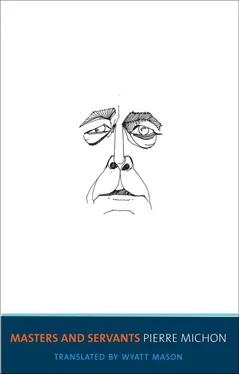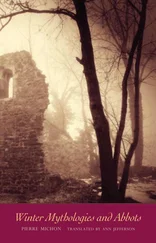He had fallen asleep in a blue sitting room, downstairs; he had fallen prey to one of those terrible coughing fits that threw him fully dressed onto the nearest bed where he lay shaking for hours, this impassioned cough breaking him apart. He caught his breath a little; there was blood on the lace of his collar; he panted between the mirrors, his head tipped back, lost. I had to help him, and I knew very well that pious exhortations would have little effect on him; I don’t know why I thought to praise his paintings, I who am in no position to do so and who until then had made no such effort — and anyway he never asked for an opinion from anyone about his work, he would always interrupt, with an assurance that seemed either offended or derisive, as I’ve already said. So I talked to him about the pleasure his work brought me, the illusion of depth in his paintings, his marquises. How could I not have noticed before how sick he was with pride? He was half sitting up on his elbows and was looking right at me; without a doubt, for the first time I interested him, I was something other than that fool he liked, that priest he made fun of, I was easing some of his suffering but it wasn’t enough, it would never be enough. I played the good apostle, I assured him that in the end he had succeeded at feigning the world; the crudeness of such a lie appalled me. He sat bolt upright, he looked at the birds fleeing in trompel’œil on the ceiling at top speed; he laughed, curtly, which didn’t surprise me. He whistled between his teeth, without anger: “Is that all?” Then, as helpless as a child, plaintive, “And my reward? My wage?”
He was the best-paid painter of the time. That he lived like a hermit was his business, whether out of coquetry or greed: but he could have afforded a white palace all his own, and trees under which he could have coughed to his heart’s content, could have spent his princely wages on a deathbed, some of the money thrown at him year after year by Gersaint, Jullienne, the Orléans. I refused to understand: I looked at him questioningly, without a word. He seemed to be hesitating; something childish fleetingly enlivened him, like long ago; he got up with a jump that should have exhausted him, and from his morning coat he took the key to the south wing and handed it to me; he was trembling; “Go see for yourself,” he said; and with a sort of tenderness: “I wonder if Pierrot has ever seen what he will now?” He firmly pushed me outside; I turned around to wait for him, he gave me the sign to go alone; from behind me I heard another coughing fit, and then the door of the box was shut tight, the cough rattling at the windows briefly, ceasing.
This air of mystery, this key straight out of Bluebeard, had prepared me for the worst, for some sort of villainy. I pushed on the door of the south wing, and strolled through the boudoirs: I saw no crime, only libertinism, a lot of it, and some very beautiful paintings he had done. It wasn’t much of anything, really; just some very naked women, at their moment of pleasure, large and vivid, turgid like Rubens, playing luxuriantly on a carpet of dresses and fallen leaves, deep in a wood when before he had only dared paint its fringe. Just female flesh made pure light, exaggerated, and eerily undone; and of course he had also depicted, incidentally, what gives them pleasure, the futile and aggressive part of man they want, that falls prey to their excess; but he would have done better to have limited himself to the inflection of a neck, the bend of a wrist, a leg in the air — these were sufficient indication of the extent of their joy; the painter could have forgone what was too often apparent. These ravishings had faces; they were the same women, the same as always, those few that run through a life and upon whom desire happens to fall, the Agnèses, the Elisabeths, and Gersaint’s wife, all the wives, the daughters and mothers, the scatterbrained and the sullen, an Italian pastelist for certain, a servant with simpering airs; but these weren’t exactly the same women; because these were held aloft by the graces of a somber man leaning into them, a maestro whose profile was merging with the foliage, enough in shadow that flesh had become light, a ghost or a thing of the trees, but if he had turned toward us, perhaps we would have recognized the big nose and the offended look: he had them. He had them? Was it he with his little touch and his incalculable desire; was he both cause and beneficiary of these thousand little deaths they wouldn’t die? He had nothing: they were still running off, ruthlessly held there they were escaping, both the little servant whom he’d had and Gersaint’s wife whom he’d not, Elisabeth whom perhaps he’d had, subjugated and had, terrified and had, scandalized and not had, and who cares whether he had or hadn’t laid his hands on them, since they hadn’t dedicated their drunkenness to anyone: he wasn’t the Sole Proprietor; and there, routed by his attention, his desires, his touch, they pivoted, they offered themselves over to nothing, again, to the wind and to the land, to the coming evening, to the tumult of their lips, the convolution of their loins, with all this white highlighting their eyes and their stomachs. They were fleeing. And it wasn’t with little pirouettes anymore, little lying whispers that make the rounds during minuets, those may haps , those see you anons , those we shall sees that tirelessly ricochet through rural gatherings en concerts; it had become the final refusal, the right away , the now , and at the same moment a cry, which surely burst forth and shone brightly, rose straight up to the tops of the trees as if midday itself had cried out, and it had to have been midday that had cried out, because nothing was there, no one, neither he who was the superfluous cause of this pleasure, nor she who was its extravagant effect; and the one who had cried out, who had finally stopped talking, who had finally stopped thinking she was somebody, a dress and a name, Madame de Jullienne, Mesdemoiselles de Jullienne, Elisabeth or some cheap slut, the one whose features we recognize — the full cheeks and mouth, the long neck and throat — she sank away at the instant of her cry, disappearing, becoming this superlative creature, exalted and ferocious, who in various flashy frocks was always the same and was all of them, was interchangeable, unnatural, this undifferentiable Lilith who gnashed her teeth and fainted away, more imaginary than angels, but like angels was given glorious body and fabular flesh, and like them let out a sort of exaggerated song.
I hear whispering across his grounds the wind, the promising, incompliant little mouths, the rustlings of satin. He needed all that — the little gestures, the words and the satins, musics. He smothered this cry with all of it. Underneath, he painted that cry. This cry or this prodigious silence that reigned in the south wing, the intense cry women make that we hear at the beginning, in terror and breathlessness, when we appear in this world that never makes good on its end of the bargain.
I left; it could have been six o’clock, the afternoon was beautiful; the air was thick with the scent of lindens; at the edge of the neighboring meadow, two horsemen in greatcoats were chatting; the evening sun caught their plumes, on their no young shoulders the great cross and its fleurs-de-lys were bluing in the shadows like wings; they had dismounted from their horses and, with one hand on their saddletrees, were peacefully watching young girls singing in the meadow.
Let us go to Cythera
on pilgrimage, two by two.
Each willfind her pleasure,
in amusements sweet and true .
He was still coughing in the blue sitting room. He told me what little he had to say: that in his youth, not to have every woman had seemed an intolerable scandal. He was thirty-seven.
Читать дальше












